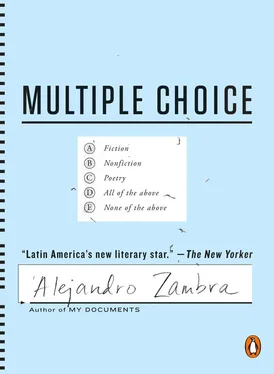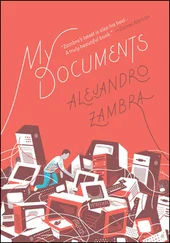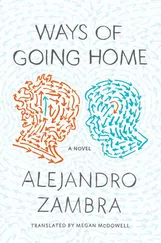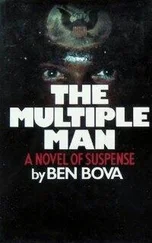(10) This is not me talking. Someone is talking for me. Someone who is faking my voice. My father will die soon. The person faking my voice knows this, and doesn’t care.
(11) Maybe by the time the book this fucking voice faker is writing gets published, my father will be dead. And people will think that there is something true in what my fake voice says. Even though it isn’t my voice. Though I would never really say what I’m saying now. Though no one has the right to speak for me. To make a fool of me. How easy it is to laugh at me. To blame me, to feel sorry for me. It has no literary merit.
(12) Clap for the writer, how ingenious. Clapping for him the way you have to clap for that kind of person. But clap him right in the face, with both hands, until you can’t tell anymore where the blood is coming from.
(13) Now he’s saying that I give orders, that I know how to torture. That I’m a chip off the old block. Now he says I’m telling you to stick a pitchfork up his ass.
(14) Now he’s saying I don’t have the right to challenge my destiny. That I’m one of the walking dead. That I’m saying things I’m not saying. That I even thank him for saying them for me. Now he’s searching for words to tattoo on my chest using the biggest drill he has.
A) None
B) 9
C) 10, 11, and 12
D) 13 and 14
E) 14
65.
(1) With the money he won in the lottery, the old man decided to fulfill his lifelong dream, but since his lifelong dream had been to win the lottery, he didn’t know what to do. In the meantime, he bought himself a Peugeot 505 and hired me to drive it.
(2) I went to pick him up one Saturday, and the plan was to hit the racetrack, but he was watching Sábado Gigante on TV and didn’t feel like going out. He handed me a beer, and together we watched the segment “So You Think You Know Chile?” Don Francisco was traveling through Ancud and Castro, interviewing people who lived in some stilt houses, helping to cook a curanto, making a lot of effort to tug a Chilote wool cap over his extra-large head.
(3) “That’s what we’ll do,” he told me, like he’d had a revelation: “We’re going to tour Chile in the new car.” I asked him why not travel the whole world, like Don Francisco himself in “The Spotlight Abroad.” He replied that before seeing the world, one had to really see one’s own country. I asked him where we would start, in the north or the south. “In the north, man, the north. What do you mean where do we start? This shit goes north to south.”
(4) His opinion at the end of the trip: “Chile is a beautiful country. People are always complaining about the lack of freedom and the dictatorship and all that, but they don’t realize that Chile is a beautiful country.”
(5) I liked seeing my country too, but I don’t remember that much. I drove like a zombie, to the beat of the old man’s terrifying snores. Sometimes, out of the corner of my eye, I’d see the glint of drool in his open mouth. When he was awake, he didn’t like to listen to music, just some cassettes with jokes by Coco Legrand. I came to hate Coco Legrand — his jokes, his voice, everything.
(6) I remember the cold near Los Vilos, where I smoked alone on the side of the road while five meters away, in the backseat of the car, the old man fondled two sad, big-titted whores. I remember when I woke him up on the beach at Cavancha and he thought I was a mugger. In Pelluhue a giant wave almost swallowed him, and I had to dive into the water in my underwear to save him. In Pichilemu he started to scold two pot smokers who were pacifists but still wanted to kick his ass. I also had to defend him in Talca, Angol, and Temuco.
(7) I remember the fear I felt in restaurants when the old man started to harass the waiters. My only moment of freedom was when he came down with some kind of stomach illness and had to be hospitalized in Puerto Montt. Those days I was fairly happy, but maybe only for a few hours, parked close to downtown, eating cheese empanadas while I listened to Los Angeles Negros and Los Prisioneros and the rain fell. And in Cañete. I was also happy in Cañete, but now I can’t remember why.
(8) The old man paid me well, I have to admit. Afterward he went to travel around Europe and the United States, and we lost contact. Then one day he called me to ask if I knew anyone who could ghostwrite his autobiography for him. I told him I could do it myself, that I’d become a writer. It wasn’t true, but I needed the money. He believed me.
(9) We agreed on a rate per word; the only thing he cared about was that the book was fat. I started to write his story. We met every morning and I listened to him. He was so presumptuous, such a poor observer, so arrogant, but I listened to him and took plenty of notes. “The Spanish are friendly,” he might say to me, for example. “The Spanish from where?” I asked him. “What do you mean from where, asshole? The Spanish from Spain,” he replied.
(10) I also had to interview his children, a man and a woman more or less my age, who had helpless faces and claimed to love and admire the old man, as did his ex-wife, a woman who always held a rosary in her right hand and who talked up a storm. It was clear they were lying, and I couldn’t understand why they collaborated. Later, I learned that my boss had doubled their monthly allowances.
(11) One time I asked him, without any mean intention, if he thought the money had changed him. “You really ask some idiotic questions, kid. Of course it did,” he replied. “Money changes everyone.” Later I asked him for his opinion on Pinochet, which I already knew, I only wanted to make sure. It was 1987, one year after the assassination attempt, a year before the referendum. I warned him that Chilean public opinion about Pinochet was going to change in the coming years whether he won or lost the referendum, and that maybe it wasn’t such a good idea to come off as a fervent supporter of the dictator. “Let it be very clear in my book that I think Pinochet saved Chile, and that I want those mongoloids who tried to kill him to rot in hell,” he answered.
(12) I asked him what he thought about Don Francisco. “Don Francisco was always my inspiration,” he replied. “Don Francisco has traveled all over the world,” I told him. “But no one invites Pinochet anywhere.” I don’t know why I said that to him. He sat there thinking. I warmed to the subject, and added that Don Francisco had shown us the Chile that Pinochet destroyed. “Go fuck your sister,” he replied.
(13) I said nothing; I was used to that kind of humiliation. At the end of the day, I was only a ghostwriter. I worked for two more months and finished the book. Three hundred fifty-nine pages. I’m ashamed to confess that I was proud of some passages, that they struck me as well written, even eloquent. The book was garbage, but at least there were some parts that were, to my mind, inspired, and some elegant, almost baroque turns of phrase. He paid for a printing of five hundred copies. My Journey Through the World and My Nation was the title he chose.
(14) I thought I would never see him again. For fifteen years I heard nothing from him, until one day he called me out of the blue. I asked him how he’d gotten my number. “A man has his ways,” he said. He told me he was sick and could die soon, and he wanted to correct some things in the book for a second edition. I asked him if the first one had sold out. “I still have about a hundred books,” he said, “but that’s not enough.” “What is it you want to correct?” I asked him. “Just the grammatical errors,” answered that old piece of shit.
A) None
B) All
C) Any
D) A
E) B
66.
(1) I have six children: four boys and two girls. One of the girls is a lesbian, but I love her anyway because she’s a good person. If I classify my children according to those terms, four are good and two are bad. One hundred percent of the girls: good. The boys: fifty percent bad.
Читать дальше












